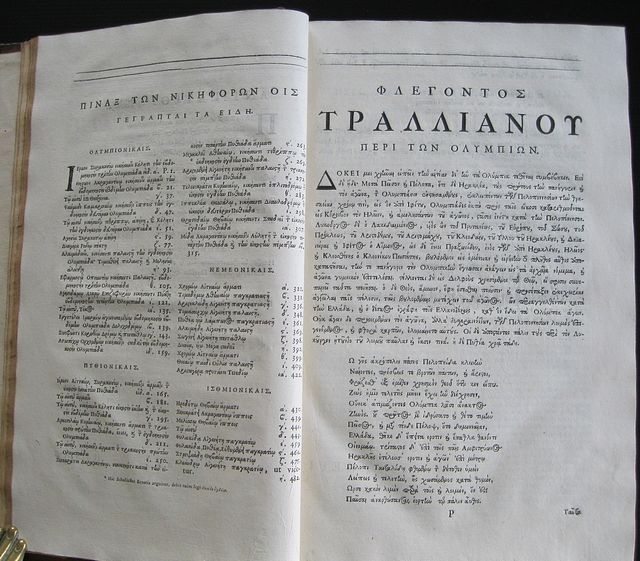Classical Authors: Oxonii- Oxford E Theatro Sheldoniano 1697. Portrait, [17], pp497 (56,59-487) [42] [4] pp77 [1] Folio. The first English edition of the Greek text edited by Richard West & Robert Welsted, fellows of Magdalen College. Engraved portrait of Pindar by M. Burghers. facing the Title page. Dedication to the Marquess of Tavistock signed by the editors. Preface. Life of Pindar in Latin by Thomas Magister. Chronology of the Olympiads composed by the Bishop of Litchfield. Passages from various Greek Classical authors on Pindar including a fragment from Phlegon Trallianos Περί του Ολυμπιον, and notes from Suidas Parallel Greek and Latin text, with a Latin prose paraphrase, Latin notes and scholia in Greek printed below. After the Index is the Latin verse translation by Nicolas Le Sueur (1545-1594) Pindari Opera Omnia viz Olympia. Pythis, Nemea,& Isthmia . Latino carmine reditt per Nicolaum Sudorium in curia Parisiensis Inquisitionum Præsidem Dibdin calls it "a beautiful and celebrated edition... on the whole, we must allow that the editors of this magnificent work have taken infinite pains to bring together every thing which could illustrate and improve the reading of the poet". The editors compared the Mss held by the Bodleian with that of the Biblioteca Palatina. Folio. full calf; gilt spine with 6 raised bands; corners slightly bumped; ex- libris to front pastedown. Main body of text bright, crisp and clean Prelims [ to end of table of Olympiads] and second part : Latin translation of Nicolas Le Sueur printed on slightly poorer quality paper and thus somewhat toned. Engraved portrait of Pindar and large title page vignette by M. Burghers. Pindar Πίνδαρος (c. 522 – c. 443 BC) was an Ancient Greek lyric poet from Thebes. Of the canonical nine lyric poets of ancient Greece, his work is the best preserved. Although he probably spoke Boeotian Greek he composed in a literary language that tended to rely more on the Doric dialect . There is an admixture of other dialects, especially Aeolic and epic forms, and an occasional use of some Boeotian words. He composed 'choral' songs. Scholars at the Library of Alexandria collected his compositions in seventeen books organized according to genre: 1 book of Humnoi – "hymns" 1 book of Paianes – "paeans" 2 books of Dithuramboi – "dithyrambs" 2 books of Prosodia – "processionals" 3 books of Parthenia – "songs for maidens" 2 books of Huporchemata – "songs for light dances" 1 book of Enkomia – "songs of praise" 1 book of Threnoi – "laments" 4 books of Epinikia – "victory odes" Of this vast and varied corpus, only the Epinikia – odes written to commemorate athletic victories – survive in complete form; the rest survive only by quotations in other ancient authors. PHLEGON, of Tralles in Asia Minor, Greek writer and freedman of the emperor Hadrian, flourished in the 2nd century A.D. His chief work was the Olympiads, an historical compendium in sixteen books, from the 1st down to the 229th Olympiad (776 B.C. to A.D. 137), of which several chapters are preserved in Photius and Syncellus. Two small works by him are extant: On Marvels, containing some ridiculous stories about prophecies and monstrous births, but instructive as regards ancient superstitions; On Long-lived Persons, a list of Italians who had passed the age of 100, taken from the Roman censuses. Other works ascribed to Phlegon by Suïdas are a description of Sicily, a work on the Roman festivals in three books, and a topography of Rome. Graesse 5 p295; Brunet 4 p659; Dibdin II 289. Classical Authors Poetry Pindar











